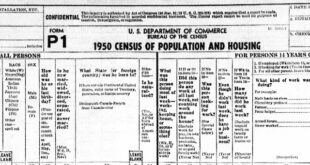
But genealogists have just as much trouble, if not more, with the ubiquitous and ever-present “brick wall”. This is the common situation where you have no sources for a piece of information at all! Actually, for it to be a true brick wall, you don’t know the information at all. I could have a bunch of inaccurate or hearsay sources for Zio Angelo, but if I don’t even know where he was born and I don’t have a way to guess, that’s when I am in genuine brick wall territory.
There is no way in a single column to cover the ways to work around a brick wall, but hopefully I can give you some ideas on how to attack your problem. Primarily, you need to know the possible places for each type of information to be found. You also need to know the limitations of each possible source.
For example, let’s say you’re looking for the birthplace of an ancestor who came to America in the 1890s and he died in Chicago in 1906. You don’t know the year or the town he was born in. You do know he died in Chicago in 1906 so you get a copy of his death certificate. As many Chicagoans have found out, the information on the older death certificates is quite sparse. In 1906, you’re lucky to get a birthplace “Italy”. The age might say “around 45”. So you are having trouble with this critical information for your great-grandfather. Now what?
Older Cook County records are weak about such information. Maybe it wasn’t important to them at the time, but it is certainly important to us. What do you do?
Right now, you don’t know Big Papa’s parents, where he was born or when he was born. His death certificate was of no use, and if you had his birth certificate, we wouldn’t be looking for his birth, would we? What other documents were available for his during his lifetime? World War I draft registration? Nope, he died before the war. Citizenship? Nope, he didn’t live long enough to apply for it. Marriage? Found it, but it doesn’t list his birthplace or his parents. You keep ruling out the types of documents that could have been generated about him. Census? 1900 is the only one he was in, and of course it says “Italy”. It does help that there are some siblings listed. We need them now.
The first step when you don’t have specific records about someone is to figure out who are other relatives of Big Papa that DO have more records. You need to hope that someone lived long enough to get a death certificate with more details on it. In this case, the best solution is to find out the names of siblings. Great-grandpa obviously died very young if he was only here for less than twenty years. Where were his brothers and sisters born? They could have been born in the United States, and Chicago in particular, or perhaps even another city where they tried to make a living before coming to Chicago. However, if any of the brothers and sisters were born in Italy, it is a pretty safe bet they were born in the same town as Big Papa. It is very unlikely that a group of siblings would be born in several different “communi”. It is even less likely for siblings to be born in different provinces or regions from each other. Yes, there are always exceptions, but right now you need some statistics on your side.
So, with all this in mind, what do we look for? Start with brothers. The boys have more records about them. Unfair, but it’s true. The boys had to register for either World War I or II. The girls didn’t. The boys filed for citizenship papers. In many cases, their wives were “grandfathered” in, so there is no paper for them with this detail on it. And the girls have papers under married names, and if you don’t know their married surnames, you won’t be able to find those documents. Now you’re in “genealogical gridlock”! You need one paper to find about someone else, and you need them to find out about her…. Welcome to the Brick Wall!
So you need to find the death certificate of your great-grandfather’s brother. It still may not have the precise birthplace, or even the parents listed. But if you can be sure it’s his brother, you can use the data you gather from this death certificate to find other documents that might have the data you need. You’ll be unraveling the gridlock!!
Next month, I’ll show how I got around a MAJOR brick wall!
 Fra Noi Embrace Your Inner Italian
Fra Noi Embrace Your Inner Italian





